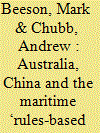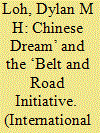|
|
|
Sort Order |
|
|
|
Items / Page
|
|
|
|
|
|
|
| Srl | Item |
| 1 |
ID:
191562


|
|
|
|
|
| Summary/Abstract |
Despite systemic internal and external differences, Australia and China have shown striking similarities in their pursuit of disputed maritime resource and jurisdictional claims. This high-stakes area of international politics is governed by a codified, globally accepted international legal regime (the United Nations Convention on the Law of the Sea), making it an important case for examining the relationship between states’ foreign policies and the ‘rules-based international order’. In the South China Sea, Beijing is haunted by the legacy of its strong geopolitically driven support for an expansive law of the sea regime in the 1970s. Strategic considerations also drove Australia’s belated embrace of international legal processes in the Timor Sea in 2016. Before that, successive Australian governments had been as keen to pursue national maritime interests through bilateral negotiations as their Chinese counterparts. Australia’s shift was enabled by pro-Timor domestic public opinion and a confluence of geographic and commercial circumstances not present in the South China Sea.
|
|
|
|
|
|
|
|
|
|
|
|
|
|
|
|
| 2 |
ID:
191564


|
|
|
|
|
| Summary/Abstract |
This article investigates the linkage between Kim Jong-un’s power consolidation and Pyongyang’s abrupt return to the denuclearization negotiation table in 2018. It argues that behind Pyongyang’s turnabout lie the three unstable pillars of the Kim family’s rule: a faithful winning coalition, the juche ideology, and Chinese patronage. Upon taking office in 2011, Kim had to debilitate his father’s winning coalition to consolidate his power. With the winning coalition enervated, Kim could not expect its willingness to suppress the masses were they to develop into an ejectorate, and therefore introduced market reforms to secure the people’s support. The reforms, in return, inevitably eroded the ideological appeal of the Kim family, thereby rendering his hold on power more vulnerable to economic pressure. Under such circumstances, Chinese patronage increasingly faltered. It is due to the instability of these three pillars that Kim Jong-un returned to the negotiating table.
|
|
|
|
|
|
|
|
|
|
|
|
|
|
|
|
| 3 |
ID:
191560


|
|
|
|
|
| Summary/Abstract |
The ‘Chinese Dream’ (CD) and the ‘Belt Road Initiative’ (BRI) are signature programs of President Xi Jinping. Much of the scholarships on these two projects have concerned itself with either domestic propagandistic effects or external foreign policy impact. These concerns have underpinned the literature’s focus on material expressions of such projects, be it through infrastructural construction in the case of the BRI or propaganda tools in the example of the CD. Yet, an important but understudied element of these two projects is the narratives that they tell and the impact of these narratives. In that regard, this article complements existing studies of the CD and the BRI by reading the projects as grand narratives. Drawing on international practice theory, I trace an explicit link between narratives and practices to demonstrate how narratives activate, anchor, produces and contest political practices of some sub-state actors in China. That is to say narratives: (i) serve as signposts for sub-state actors’ orientations in clarifying what are relevant/irrelevant and appropriate/inappropriate practices; (ii) provide ‘background’ stock of information where actors draw on to legitimize their practices when they speak of the BRI and CD; and (iii) create conditions for both the creation of new practices and contestation of existing ones. I then argue that four narrative-practice processes are seen in the Chinese example: contestation, sustenance, activation, and production.
|
|
|
|
|
|
|
|
|
|
|
|
|
|
|
|
| 4 |
ID:
191561


|
|
|
|
|
| Summary/Abstract |
This article analyzes how and why contemporary Global South countries’ South–South cooperation (SSC) exhibits a convergence between normative and material interests. The normative approach underlines that SSC is driven by a country’s experience with colonialism and underdevelopment. SSC is perceived as a mechanism to alter the Global South’s asymmetrical relations with the dominant Global North. The material approach highlights the strategic values of SSC for Southern powers. Through SSC, Southern countries desire to improve their reputation, garner support from other South countries in international fora, and pursue their own broader economic agendas. By utilizing domestic politics analysis, Indonesia’s experience shows that a more pragmatic approach to SSC reflects a broader transformation of Indonesia’s domestic political configuration. While Indonesia’s early practices of SSC prefer normative over material interests, the country’s current policies display a convergence of its material and normative interests, which signifies the emergence of ‘interest-based Third World solidarity’.
|
|
|
|
|
|
|
|
|
|
|
|
|
|
|
|
| 5 |
ID:
191563


|
|
|
|
|
| Summary/Abstract |
When a war directly intrudes citizens’ living space, it becomes a war of necessity for the public to defend themselves. However, current literature on public support for war has focused exclusively on wars of choice, not of necessity. Thus, we wonder if existing indicators of war support have explanatory power in this context. In this article, we examine existing indicators in a war of necessity—a cross-Strait conflict between Taiwan and China—to study how the public in Taiwan reacts. In addition to finding support for most of our hypotheses, the new context also contributes novel findings to the literature.
|
|
|
|
|
|
|
|
|
|
|
|
|
|
|
|
|
|
|
|
|